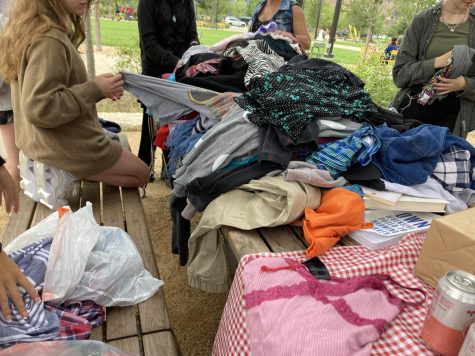Environmental group organizes clothes swap, fights fast fashion

Environmental group Omaha Students for Sustainability held a clothing swap and picnic on Sep. 5. Students from across the Omaha area exchanged clothing to reduce pollution and promote mindful consumption.
At the Gene Leahy Mall, picnic tables were piled high with donated shirts, pants, shoes, and shorts. Next to the clothing, fruit, bars and vegan cookies were offered to attendees. Students perused the piles, selecting items to add to their wardrobes and donating items to the stacks. By wearing secondhand clothing, they hope to reduce their negative environmental and economic impacts.
“Clothes make up a huge part of waste,” said senior Chloe Johnson, a board member of Students for Sustainability. “Not only is it going to landfills, but so much of it is made with plastics and chemicals, it takes a really long time to biodegrade. There’s a lot of pollution.”
According to the Columbia Climate School, the fashion industry causes 10% of global greenhouse gas emissions and 20% of global wastewater. The chemicals used in the dyeing process are responsible for an estimated 17-20% of industrial water pollution.
Students for Sustainability is an organization made up of high school students across Omaha. They organize a variety of environmental justice efforts, including weekly park cleanups and protests for climate action. They are also working on introducing composting to Omaha area schools.
This year, Students for Sustainability is focused on empowering teenagers to make environmental impact. They believe that even when teenagers can’t vote, they can use resources of knowledge, money, and time to show their values. Students for Sustainability also makes connections between young people in need of service hours and organizations doing environmental work.
For Johnson, the importance of shopping secondhand goes beyond the environmental effects and implications.
“There’s not being enough done to regulate fast fashion,” Johnson said. “When clothes are being produced that cheaply, people are being exploited.”
Through the clothing swap, Johnson hopes that attendees take a sense of pride in wearing secondhand clothing and the knowledge that their actions are making an environmental difference.
“There’s a feeling of empowerment,” Johnson said. “You’re doing something to shift the tides, shift the norms, shift the economic drive to secondhand clothing.”
Your donation will support the student journalists of Omaha Central High School. Your contribution will allow us to purchase equipment and cover our annual website hosting costs.

Hello, Register readers! I'm Noa Gilbert, (they/them) and your news editor! I'm a senior and this is my second full year on staff. In my free time, you...















